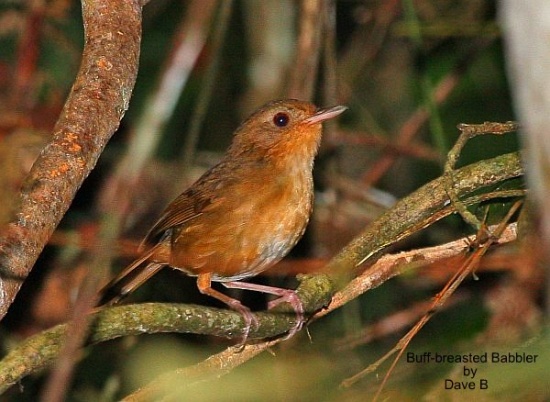(Picture added) |
(Picture of subspecies. References updated) |
||
| Line 9: | Line 9: | ||
* Whitish belly | * Whitish belly | ||
Sexes similar, juveniles with strongly rufescent upperparts. | Sexes similar, juveniles with strongly rufescent upperparts. | ||
| + | [[Image:ZzIMG 3986 buff-breasted babbler 2.jpg|thumb|350px|right|Subspecies ''fulvum''<br />Photo by {{user|baboon|baboon}}<br />Longheng Tun, Longzhou, Guangxi, [[China]], October 2015]] | ||
====Confusion species==== | ====Confusion species==== | ||
[[Abbott's Babbler]] has grey on foreparts and is heavier billed. [[Spot-throated Babbler]] has fine spots on throat. | [[Abbott's Babbler]] has grey on foreparts and is heavier billed. [[Spot-throated Babbler]] has fine spots on throat. | ||
| Line 15: | Line 16: | ||
Locally common in its range. | Locally common in its range. | ||
==Taxonomy== | ==Taxonomy== | ||
| − | There are 5 subspecies: | + | ====Subspecies==== |
| + | There are 5 subspecies<sup>[[#References|[1]]]</sup>: | ||
* ''P. t. assamense'' from northeast [[India]] to east [[Bangladesh]] and north and west [[Burma]] | * ''P. t. assamense'' from northeast [[India]] to east [[Bangladesh]] and north and west [[Burma]] | ||
* ''P. t. grisecens'' in southwest [[Burma]] | * ''P. t. grisecens'' in southwest [[Burma]] | ||
| Line 26: | Line 28: | ||
Evergreen forest. Sometimes also in mixed deciduous open or deep forest, secondary growth, bamboo thickets and undergrowth of secondary and logged forest. Up to 1550m, above 610m in [[Malaysia]]. | Evergreen forest. Sometimes also in mixed deciduous open or deep forest, secondary growth, bamboo thickets and undergrowth of secondary and logged forest. Up to 1550m, above 610m in [[Malaysia]]. | ||
==Behaviour== | ==Behaviour== | ||
| − | + | Usually seen in pairs, sometimes associated with other small babblers. Skulking, keeps close to the ground in dense undergrowth. | |
| − | Usually seen in pairs, sometimes associated with other small babblers. Skulking, keeps close to the ground in dense undergrowth. | + | ====Diet==== |
| + | Feeds on insects. | ||
| + | ====Breeding==== | ||
Breeding season from March to July, multi-brooded. The nest is a deep cup or dome or semi-dome made of dry bamboo, other leaves, fine grasses and thin rootlets. It's placed on the ground, sometimes also at the base of a sapling up to 1.5m (mostly not higher than 0.3m). Lays 3 - 4 eggs.<br /> | Breeding season from March to July, multi-brooded. The nest is a deep cup or dome or semi-dome made of dry bamboo, other leaves, fine grasses and thin rootlets. It's placed on the ground, sometimes also at the base of a sapling up to 1.5m (mostly not higher than 0.3m). Lays 3 - 4 eggs.<br /> | ||
Resident species. | Resident species. | ||
==References== | ==References== | ||
| − | #{{Ref- | + | #{{Ref-Clements6thAug15}}#{{Ref-HBWVol12}}#{{Ref-RasmussenAnderton05}} |
{{ref}} | {{ref}} | ||
==External Links== | ==External Links== | ||
Revision as of 19:10, 9 October 2015
Alternative names: Tickell's Babbler; Buff-breasted Jungle Babbler; Mountain Brown Babbler
- Pellorneum tickelli
Identification
13 - 15cm. A nondescript small brown babbler:
- Squarish-tipped longish tail
- Forehead feathers seem slightly scaled with pale shaft-streaks
- Warm brown above, buff below
- Whitish belly
Sexes similar, juveniles with strongly rufescent upperparts.
Confusion species
Abbott's Babbler has grey on foreparts and is heavier billed. Spot-throated Babbler has fine spots on throat.
Distribution
From northeast India and Bangladesh over Burma and south China (Yunnan and Guangxi) to Thailand, Indochina and peninsular Malaysia.
Locally common in its range.
Taxonomy
Subspecies
There are 5 subspecies[1]:
- P. t. assamense from northeast India to east Bangladesh and north and west Burma
- P. t. grisecens in southwest Burma
- P. t. fulvum in south China (Yunnan, Guangxi), southeast Burma, north Thailand, Laos and north Vietnam
- P. t. annamense in Cambodia, south Laos and south and central Vietnam
- P. t. tickelli in south Burma, west and south Thailand and peninsular Malaysia
Sumatran Babbler was formerly included in this species.
May form a superspecies with Temminck's Babbler.
Habitat
Evergreen forest. Sometimes also in mixed deciduous open or deep forest, secondary growth, bamboo thickets and undergrowth of secondary and logged forest. Up to 1550m, above 610m in Malaysia.
Behaviour
Usually seen in pairs, sometimes associated with other small babblers. Skulking, keeps close to the ground in dense undergrowth.
Diet
Feeds on insects.
Breeding
Breeding season from March to July, multi-brooded. The nest is a deep cup or dome or semi-dome made of dry bamboo, other leaves, fine grasses and thin rootlets. It's placed on the ground, sometimes also at the base of a sapling up to 1.5m (mostly not higher than 0.3m). Lays 3 - 4 eggs.
Resident species.
References
- Clements, J. F., T. S. Schulenberg, M. J. Iliff, D. Roberson, T. A. Fredericks, B. L. Sullivan, and C. L. Wood. 2015. The eBird/Clements checklist of birds of the world: v2015, with updates to August 2015. Downloaded from http://www.birds.cornell.edu/clementschecklist/download/
- Del Hoyo, J, A Elliott, and D Christie, eds. 2007. Handbook of the Birds of the World. Volume 12: Picathartes to Tits and Chickadees. Barcelona: Lynx Edicions. ISBN 978-8496553422
- Rasmussen, PC and JC Anderton. 2005. Birds of South Asia: The Ripley Guide. Barcelona: Lynx Edicions. ISBN 978-8487334672
Recommended Citation
- BirdForum Opus contributors. (2024) Buff-breasted Babbler. In: BirdForum, the forum for wild birds and birding. Retrieved 11 June 2024 from https://www.birdforum.net/opus/Buff-breasted_Babbler





